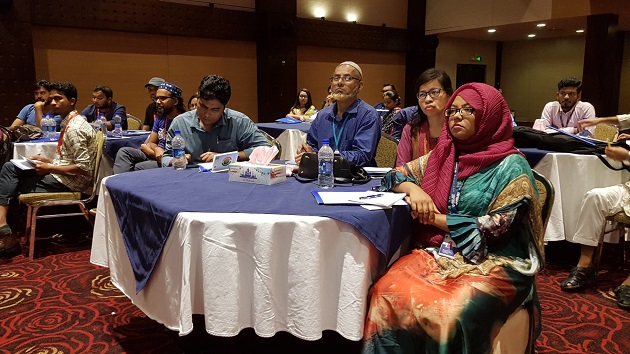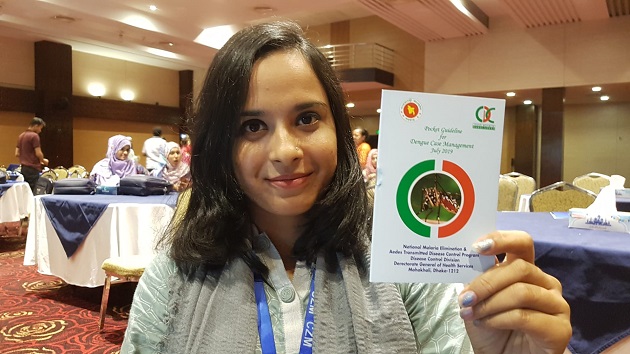As 200 cases of dengue were reported in Cox’s Bazar district this year, including in the Rohingya refugee camps, major efforts are required from all partners to protect host community and Rohingya refugees from dengue virus.
Since July, WHO has organized a training on dengue outbreak preparedness, disseminated the national guideline for clinical management of dengue syndrome, distributed 3000 rapid diagnostic tests, continued with field investigations to verify EWARS alerts and confirmed cases, and is supporting and coordinating inter-sectoral work to remove mosquito breeding sites, among other initiatives.
The National Guide for Clinical Management of dengue syndrome was disseminated to all health partners in July followed by a clinical case management training for 260 doctors, nurses and paramedics provided by WHO with the support from the Ministry of Health.
“As of this week, in 2019 a total of 40 possible dengue cases have been reported among the Rohingya refugees, of which 8 were confirmed through rapid diagnostic test and none resulted in death. In Cox’s Bazar district, over 200 cases of confirmed dengue have been reported. The majority of these were reported in the District Sadar Hospital”, said Dr. Mohammad Mohiuddin, Medical Superintendent of 250-Bedded Cox’s Bazar Sadar Hospital.
On behalf of WHO, Dr. Balwinder Chawla, Health Cluster Coordinator, emphasized that “The key to effective clinical management of dengue is early recognition and understanding of the clinical signs during the different phases of the disease. Last month we advised all our partners to remain vigilant and use the WHO early warning alert and response system (EWARS). Today we thank you all - doctors, nurses and paramedics here present - for being at the forefront of early detection and sound clinical management”.

According to Dr. Niaz Mowla, WHO Communicable Diseases Officer, in the 60s, dengue was known in Bangladesh as Dhaka Fever of Breakbone Fever. He added that “humans are the main amplifying host of the virus which enters the human body via the skin when an infected mosquito takes a bloodmeal. During the acute phase of illness, the virus is present in the blood, after the incubation period the illness begins abruptly and is followed by three phases: febrile, critical and recovery”.
Dr. Md. Moynul Hassain, currently working at HMBD Foundation in Ukyia commented “I participated in the EWARS training last month, now I am interested in dengue case management because as a doctor I haven’t treated any dengue patient so far”.
“I think it is of great importance to build on the capacity for refugee and host community response. Considering the poor living conditions of the refugee camps, I can only imagine the possible impact if many people are affected by dengue. We should also invest in mosquito breeding prevention and educating the people to destroy mosquito breeding sites”, defended Dr. Fahmida Fhami, from Center for Zakat Management at Camp 13.
During the training, the participants learned that there is no specific treatment for dengue fever, however, there are specific guidelines to manage dengue fever patients according to their symptoms, age and co-existing conditions (including diabetes, pregnancy, hypertension, etc.) or risk factors that may need careful monitoring and hospitalization.

As the most rapidly spreading mosquito-borne viral disease in the world, dengue inflicts a significant health, economic and social burden on the populations of endemic areas. The virus affects all levels of society but has a higher impact among those living in communities with inadequate water supply and solid waste management, and where conditions are most favorable for multiplication of the main vector, Aedes aegypti.
With more 260 doctors trained in dengue clinical case management in Cox’s Bazar district, WHO expects to improve early detection and appropriate clinical management of dengue infected patients. However, further efforts are required to identify and destroy mosquito breeding sites at household, community and health facility levels. The current priority is prevention through clean-up initiatives and self-care to mitigate exposure to mosquito bites.”
